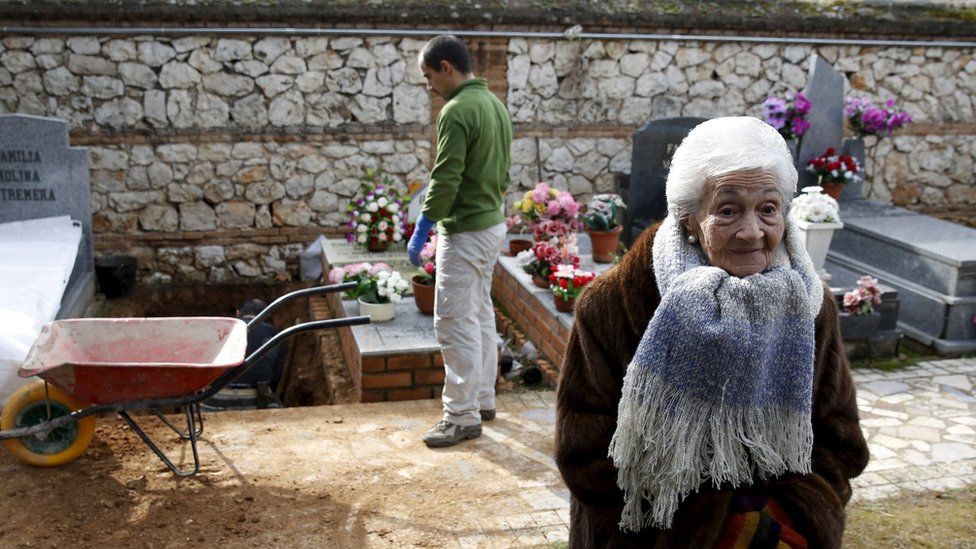Spain Franco: Victim's daughter prises open past
- Published

She had to wait more than 76 years and travel to Argentina in search of justice, but Ascension Mendieta has finally got the only thing she wanted.
"At last this moment has arrived," the 90-year-old said when volunteers removed the skeleton of the father she barely remembers from a mass grave at the edge of the main cemetery in Guadalajara, central Spain, late last month.
"Now I can be buried along with his bones," Ms Mendieta explained on what was a momentous day for her family and also a significant one for campaigners.
They want more help for relatives of the more than 100,000 still-missing victims from the Spanish Civil War (1936-39) and the ferocious repression carried out afterwards by Gen Franco's victorious Nationalist forces.
Timoteo Mendieta Alcala was executed against Guadalajara's cemetery wall on 16 November 1939 - one of an estimated 822 executions carried out at the cemetery from 1939 to 1944. The father-of-seven had been the local leader of the socialist UGT union in the village of Sacedon, where he had worked as a butcher.
During the Franco era, his family did not dare ask to have his remains removed from the grave in which he and 21 other men were buried.
But nor have the Mendieta family and thousands like them received much assistance from the Spanish state in locating and exhuming dead relatives since the dictator's death in 1975.
While volunteer associations have dug up hundreds of graves, the search for Timoteo Mendieta's remains was the first exhumation ordered by a Spanish court as part of a criminal investigation.
But it only came about as a result of a complaint heard by a judge in Argentina.
Frustrated by the refusal of local authorities to allow the recovery of her father's remains and having seen in 2008 how Spanish judge Baltasar Garzon abandoned his own probe into what he considered a genocide, Ms Mendieta travelled to Buenos Aires in 2013 after hearing that an Argentine magistrate had decided to pick up the Franco-era investigation under the banner of universal justice.
Breakthrough
Judge Maria Servini has indicted living members of Franco's security services for alleged incidences of torture from the final years of the dictatorship, as well as hearing from over 100 families looking for their relatives' remains.
In Ms Mendieta's case, Judge Servini's request to a Spanish court to have the execution victim dug up for identification purposes was granted, the first time a Spanish judge has heeded such a petition from Argentina.
"The Argentines are the ones who got this thing moving. No-one has helped us here at all," said Ms Mendieta, who is angry that none of Spain's democratic parties has been able to help her over the past 40 years.
Recovering remains
- More than 100,000 victims of executions by pro-Franco forces during and after the Spanish Civil War (1936-39) remain buried in unmarked graves all over Spain
- Victims of executions by the Republican side during the conflict received proper burial and memorials after Gen Franco took power
- Few efforts were made to locate and open mass graves in the two decades following Franco's death in 1975
- Spain's historical memory law, passed in 2007, banned public symbols of Francoism and provided subsidies to the volunteer groups exhuming and identifying remains
- But the conservative government cut off all funding for exhumations in 2012
- Judge Baltasar Garzon opened an inquiry into crimes against humanity by Franco's forces, but senior judges ruled that the statute of limitations had expired
- He was later indicted by the Supreme Court for abuse of office but later acquitted
Spain feels Franco's legacy four decades later - by Prof Paul Preston, LSE
For Paco Ferrandiz, an anthropologist at Spain's CSIC national science council who witnessed the exhumation, state institutions have obstructed all attempts to investigate the Franco era.
He describes Judge Garzon's indictment for launching a Franco inquiry as "a political message".
"When people see justice being done, some of the fear goes away. Ascension [Mendieta] has helped many Spaniards to lose their fear," said Rene Pacheco, the archaeologist overseeing the Guadalajara exhumation.
Mr Pacheco's Association for the Recovery of Historical Memory (ARMH) was given the task of exhuming the remains of Mendieta and the 21 other bodies, but it relies on volunteers to do the digging and is funded by members' donations and the generosity of a Norwegian electricians' union.
'Unforgiveable'
Mr Pacheco said that 12 families had come forward during the dig to help identify and reclaim remains from the mass grave. Records were kept in Guadalajara's municipal archives and exhumation volunteers are convinced the grave will contain Mendieta's body.
DNA samples from four skeletons will be sent to Argentina to determine exactly which set of bones should be handed over to Ascension.
"All the rest were very young men," said Mr Pacheco.
"My sister died four years ago still wishing to see something of my father. It's sad that she missed out on this. We fought together; we used to go to the cemetery and ask about the grave," recalled Ascension Mendieta during the exhumation.
"My father didn't kill anyone in the war; he was only called up right at the end. What they did cannot be forgiven. They killed us without cause."
- Published19 November 2015
- Published29 January 2012
- Published9 February 2012